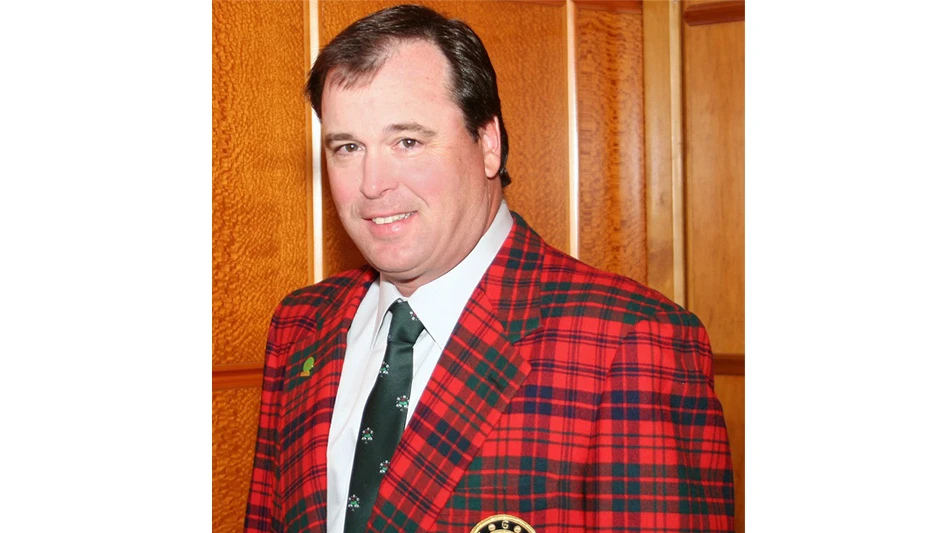 Justin Apel recognizes Jim Kirchdorfer, one of the GCBAA’s founding members. Justin Apel recognizes Jim Kirchdorfer, one of the GCBAA’s founding members.
|
The Golf Course Builders Association of America (GCBAA) is celebrating its 40th anniversary in 2011. It is also starting a new chapter under newly-appointed executive director Justin Apel.
Only in his 30s, Apel may be younger than someone you'd expect to see heading up one of the industry's largest associations. But Apel plans to use his youthful perspective to help members weather the economic doldrums and prepare for better days.
Not an industry insider. Apel has played the new-kid role before. Prior to his time with the GCBAA, Apel was one of the youngest legislative aides when he worked for Nebraska State Sen. Merton "Cap" Dierks from 2000 to 2002. After leaving the senator, Apel went into lobbying, where he was the state's youngest registered lobbyist, too.
"Age has always been a challenge for me, so this is nothing new," Apel says. "It can be intimidating being the youngest in the room, but I have found being truthful, prepared and fair levels that playing field."
Apel wasn't brought up through the traditional golf industry ranks, either. His background and degree is in agricultural science, not golf. When Apel worked for Sen. Dierks, the senator chaired the state's Agriculture Committee. Apel then spent four years as the information and education director for the Nebraska Association of Resources Districts – the trade association for Nebraska Natural Resources Districts – before heading to the GCBAA, located in Lincoln, Neb., in 2006. Before being promoted to GCBAA executive director in February of this year, Apel served the association as executive assistant and assistant executive director.
Apel says his unconventional background for a golf industry association leader works to his benefit.
"Most would think my little experience in the golf industry would be my biggest disadvantage," Apel says. "However, I think it is my edge. I have a fresh look at both new and old ideas."
Missing out on the days when golf course building was booming was actually a good thing, according to Apel.
"I obviously don't like to see what the economy has done to many fine individuals and companies. But for me to start working in this industry during the worst of times gives me a different mind-set of what's normal," Apel says. "Because of that, I have a tremendous motivation to help our members climb out. I really don't think I would have the same level of knowledge, key experiences or way of thinking if my first five years in the industry were during the glory days."
Education is the key. Education is Apel's top priority for the association and its members. It's the only way to perfect your craft, he says.
It's about sharing knowledge from the association's 375 members with one another. Any situation or problem a builder may encounter on a project has probably been tackled or overcome before by another builder, Apel says.
"Education is the key. Being proactive with our members' collective knowledge and experience base and making it available for others will be important," Apel says. "Construction methods and techniques – including best management practices from real case studies and experiences – to state of the art technologies that can solve nearly any problem in landscape construction are at our finger tips. We want to share that knowledge."
Looking far to the East for opportunity. As the GCBAA provides education to keep members at the leading edge of their profession, Apel says he will be looking for new opportunities to help builders climb out of a dark period for the industry.
While the GCBAA has had international members since the early '80s, Apel has started a series of initiatives since he was named executive director in February earlier this year aimed at positioning the association on a global scale.
Apel intends to build on the association's base of 50 international members in 15 countries.
In March, the GCBAA Board of Directors announced it would form two steering committees designed to explore what role the GCBAA should play in specifically-identified regional markets.
The International Members Enhancement Committee will evaluate and promote current membership benefits. It will also focus on developing new value-added programs as part of the effort to attract additional members to the GCBAA international membership category.
The Regional Market Committee will be more strategic in nature, Apel says, and has the responsibility of identifying various international initiatives. That committee is divided into three sub-committees in order to address the diversity of the three most active international markets: Asia, South/Central America and Europe.
"We want to fully evaluate the strengths and weaknesses of those regional markets, understand the challenges and opportunities of each, and independently develop ideas for GCBAA's potential role in those areas," Apel says.
Even more recently, the GCBAA announced a new partnership with the Asia Golf Show, held in October in Guangzhou, China. Under the agreement with the show's organizer, Reed Guanghe, GCBAA members will participate in educational panels aimed at examining core industry issues.
The GCBAA Foundation, the association's charitable arm, has been expanding globally as well. The foundation's best-known initiative, Sticks for Kids, has programs in place teaching the game of golf to underprivileged children at 550 facilities around the globe, including 130 programs in 32 cities throughout China.
Measuring success. Still young in his tenure at the helm of the GCBAA, Apel says he will be evaluating his performance often.
That evaluation will be directly tied to the level of participation of the association's members, Apel says. He'll have a measuring stick of sorts each year when the association holds its general election of officers.
"The first year that we have to recruit or possibly appoint someone to an open seat on the Board will tell me that I have failed," he says. "I want to have a waiting list of members wanting to join the team of their peers to work with me on driving this association into the future."

The Golf Course Builders Association of America celebrates 40 years of assisting and improving golf course construction, having started with just nine members in 1970.
Jeff Salem is a public relations associate for Swanson Russell, based in Lincoln, Neb.

Explore the September 2011 Issue
Check out more from this issue and find your next story to read.
Latest from Golf Course Industry
- Melrose leadership programs sending 17 to GCSAA Conference and Trade Show
- Maximizing your experience at trade shows: tips and etiquette for attendees
- Tubac’s Rancho 9 re-opens after greens renovation
- Future Leaders Academy set for Jan. 23 in suburban Pittsburgh
- 54, Turfgrass set to manage Druids Glen, Curracloe Links
- Nufarm introducing new products in San Diego
- Envu Superintendent Grant Program sending 10 members to 2025 GCSAA show
- Editor’s notebook: Let’s chat about AI





